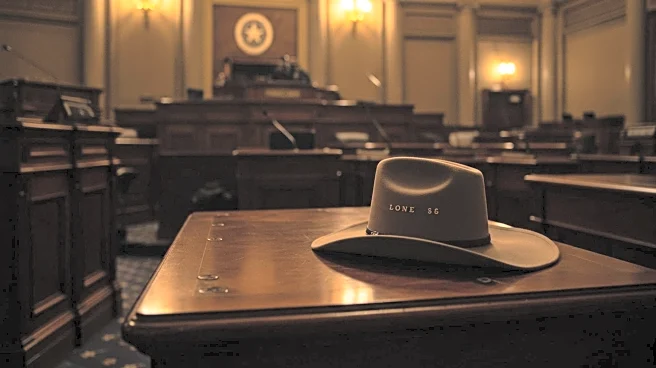What's Happening?
Texas State Senator Carol Alvarado, a Democrat, has taken extraordinary measures to filibuster a Republican-led redistricting bill. Alvarado, representing the Houston area, has equipped herself with a catheter and urine bag to sustain a prolonged speech against the bill, which aims to redraw Texas' congressional map. This move is part of her strategy to delay the passage of the legislation in the GOP-controlled state Senate. Alvarado, who has a history of lengthy filibusters, previously held the floor for over 15 hours in 2021 against an election reform bill. The current redistricting bill, supported by President Trump, has already passed the Texas House and could potentially add five Republican seats in Congress. Alvarado's preparations included a special dress to conceal the urine bag, running shoes, and a regimen of barbecue, IV infusion, and hot yoga.
Why It's Important?
The filibuster by Senator Alvarado highlights the intense partisan battle over redistricting in Texas, a state with significant political influence due to its size and population. The redistricting bill is crucial as it could reshape the political landscape by potentially increasing Republican representation in Congress. This move is part of a broader national trend where states are redrawing district lines following the 2020 census, often leading to legal and political disputes. The outcome of this legislative battle could impact future elections and the balance of power in Congress, affecting national policy decisions. Democrats, who oppose the bill, argue that it undermines fair representation, while Republicans see it as a necessary adjustment to reflect demographic changes.
What's Next?
The Texas Senate is expected to vote on the redistricting bill soon, with the Republican majority likely to pass it despite Democratic opposition. If passed, the bill may face legal challenges from Democrats and civil rights groups who argue it could disenfranchise minority voters. The filibuster, while unlikely to stop the bill, serves as a symbolic protest and could galvanize Democratic voters and activists. The national implications of Texas' redistricting efforts may also prompt federal scrutiny or intervention, especially if allegations of gerrymandering arise.









